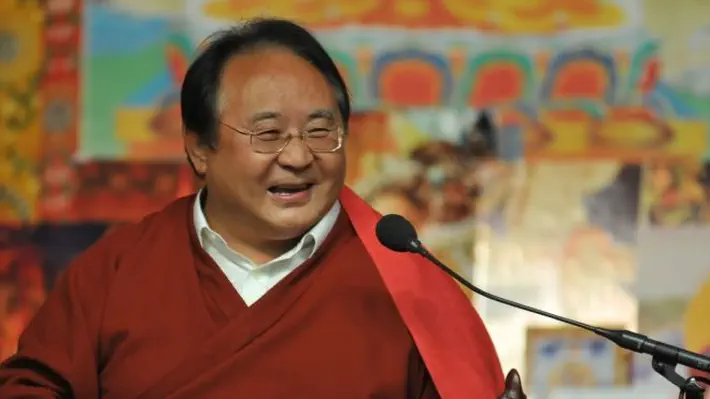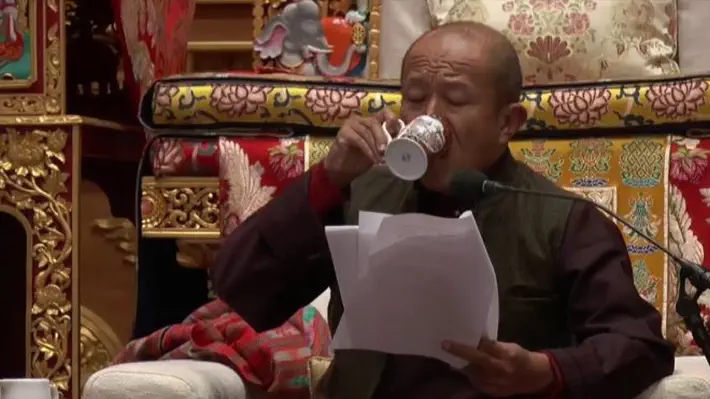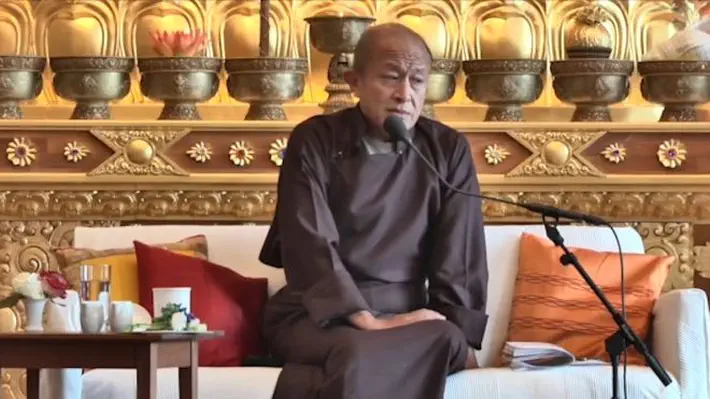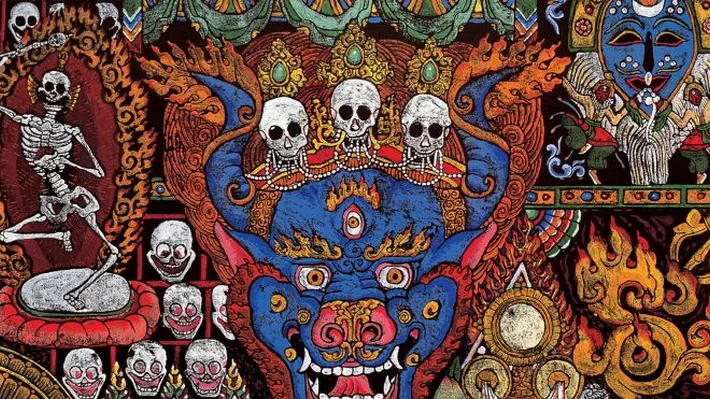Sogyal Rinpoche and the Crazy Wisdom Tradition

Public controversies surrounding the behavior of this very popular lama have spread in the media for the last decade or more. Two weeks ago a group of eight long time students1Someone complained I had “close students” here. This really might be subjective., some of them working directly under him for 10 or more years, have published an open letter warning about the difference between Rinpoche’s public and private personas.
The letter focuses on four points: beating, harsh continuous treatment (1) and sexual advances (2) towards students, lavish lifestyle (3) and no apparent engagement in formal practice (4).
In a apparently respectful manner, they advise Rinpoche to seek the help of great lamas in the tradition, further pointing out that all this behavior is kept hidden from the public at large, which they think somewhat hints at hypocrisy.
Since some people asked my opinion, I decided to write something about the situation. I have some connection with Rinpoche, having helped his staff organize a brief event in Brazil, which I attended. He is also very close to many lamas I consider my teachers, or who I aspire becoming a student of. I personally had no bad experience with Rinpoche, and even in our brief encounter, I must say he helped tremendously with my practice. I didn’t even have a personal interview with him.
I am not a dharma teacher, but sometimes people ask me such things.
Over the years, and during the said event, I heard some things about Rinpoche, and I never thought them to be untrue. But I did consider crazy wisdom a really difficult concept. The idea that spiritual masters can have the most outrageous behavior, and that it may be out of compassion… it doesn’t fit with modern society – it actually doesn’t fit with traditional society either. Actually, that’s the way it should be: crazy wisdom is not justified or justifiable. Even when it is true crazy wisdom, that is, outrageous behavior – even criminal behavior –, that comes out of compassion and wisdom. For one to accept crazy wisdom as a possibility is a level of refuge in the dharma that’s pretty rare. We should not force ourselves to accept this, but just recognize that there is such a thing, and if you don’t quite get it, just keep away from the subtlest hint that there might be something strange going on. You don’t need to believe any craziness is wisdom, or even that crazy wisdom is possible – you just need to refrain from criticizing the possibility that it might (even admittedly rarely) be true dharma.
The first thing we need to recognize is that the situation is more nuanced than at first sight it might seem. These are the few pointers I could make:
1. If you are interested in Buddhism in general, with no particular interest in the Vajrayana tradition or Tibetan Buddhism, you can and should avoid any teacher that has controversy surrounding him. Yet, there is no need to further spread criticism of the teacher being accused of bad behavior – particularly if you are not interested in his tradition. If someone asks you about him, you might tell directly what it is known publicly: that there is this whole thing about him or her, etc. Even so, you should warn others keeping an open attitude and acting generally respectfully to a sentient being that is, at the least, an object of compassion. You can say “well, better not to get close to this one”, and carefully repeat what others have said about specific bad situations. But still the right and best thing to do would be to avoid criticizing the teacher directly, even if the accusations end up being very much true and there is no wisdom at all operating there – this is not for the sake of protecting the supposedly false teacher, but your own practice. If you fear for the reputation of Buddhism in general, you must point out that Buddhists are not perfect, and that of course there are bad teachers. You can even say “well, Vajrayana people themselves say it is a dangerous thing, so I prefer to be on the safe side and follow such and such, and not go near Vajrayana”. You should not disparage Vajrayana in general, even if it is not your cup of tea, though.
2. If you have interest in Vajrayana and Tibetan Buddhism, you should understand that, although there are many bad teachers, historically there are good ones that behave very strangely indeed. All of the things Sogyal Rinpoche is accused of doing have happened in the past2Someone took exception with this, but one may refer to any numer of mahasiddha stories, or even stories as close to the 20th century. The other objection is that someone with that kind of crazy behaviour needs to also show magical powers, in order for us to accept him or her as beyond conventionality. That's true, but to comment on magic displays is also not encouraged., and do not necessarily mean that he is a bad teacher. Those situations happened in the golden age of Vajrayana in India, with masters that everyone in the Vajrayana world still reveres. This doesn’t mean necessarily that what Rinpoche does now is out of realization, but it is known to happen in Vajrayana that teachers behave this way out of realization. You should also beware that Vajrayana is supposed to be kept secret because it can be easily misunderstood. So Sogyal Rinpoche might not be the teacher for you, but teachers who act like Sogyal Rinpoche aren’t necessarily bad, according to Vajrayana. They might even be the best. Even though it is also quite possible they are bad – acting like that doesn’t say anything, in the terms of Vajrayana — it is no justification for either acception or rejection. We must just keep our judgement open. Of course, you don’t need to follow any particular teacher you feel is not right for you, and you should examine carefully, for a few years, before accepting anyone as your teacher. If you feel crazy wisdom is too much for you, by all means, follow the most well behaved teachers. And even if you kind of feel attracted by crazy wisdom, be very careful, because there is plenty of “mad guides”, false teachers who have charisma and seek followers just to exploit them in all sorts of ways.
3. If you participated in public events with Sogyal Rinpoche, or read his books, you should know that he is your teacher, and will always be.3Someone hinted that to read books by someone doesn't make that a kalyanamitra — spiritual friend/teacher — relationship. That's true, but it is best to err on the safest side. If you learned something from Sogyal Rinpoche, you should consider him your spiritual friend, which is the general title of “teacher” in all but the tantric level of teachings. Although you don’t necessarily have Vajrayana Samaya (commitment, vows) towards him, he taught you something. You don’t need to reveal that to other people, and – if you in anyway feel his actions, as described by his students, are beyond what is acceptable – you don’t need to follow him anymore (in the sense of going after his teachings). But you should never criticize him, and if people ask, you can just avoid recommending him. If pressed to talk about the issues, you can say that if the person sees a problem, they should not come close to the teacher, but all the time avoiding direct criticism. This is to protect your own practice, not Sogyal Rinpoche. If you feel uneasy about him in any way, you should just focus on recommending other teachers, and just avoid talking about him.
4. If you have Vajrayana empowerment or direct transmission from Sogyal Rinpoche, but you still have some uneasy feelings about him, you should do Vajrasattva practice. Even if the suffering he is said to have caused seems to you very great, when you accept such commitment, you have really no choice but to keep seeing him (and all beings) with pure view.4Some have argued that the Kalachakra Tantra and other literature say you should openly oppose a “bad teacher”: but that's before you took vajrayana vows under him or her. If there’s anything wrong, it was your decision to accept this level of teaching from him.5Some, including Dzongsar Khyentse Rinpoche, have raised the valid objection that sometimes people are presented with very public empowerment ceremonies, are not aware of the commitments they are taking, and that some teachers don't make them clear enough. Others have claimed that Sogyal Rinpoche himself was clear about these commitments. You can’t claim to be a victim anymore. You should be aware that this is a grave breaking of vows on your part. All the while, you can still not recommend him and keep him “hidden from others” (you don’t need to — and it is best practice not to — flaunt him as your teacher). Over the years I have talked to dozens of people who had deep meditative experiences with Sogyal Rinpoche, even in the briefest of encounters and in the most informal situations. Here one should focus on the fact that realization of practice is beyond anything we consider proper in the world. It is the most important thing. Reputation – even the reputation of dharma itself – is lower. Since realization is the ultimate expression of dharma, there is no possibility to consider any real or apparent fault as relevant, compared to that. If you had such experience, you should trust it more than any appearance, good or bad. Of course, no one forced you to take Vajrayana commitment in the first place. Vajrasattva will do you good either way, if you decide to keep your relationship with Sogyal Rinpoche on some sort of “pause” — even for several lifetimes (with such commitments, at one point, you will be together again, even if you are the teacher then...) — or if you decide to keep the same level of connection you had before.
I must say I am the kind of student that if my lama, even in the most sweet and very indirect way criticizes me, it bothers me a lot. I have a very low threshold in my comfort zone, even though I am attracted to teachers who supposedly destroy all hidden faults in the most scandalous ways… so, in practice, I am careful not to come very near and go too much beyond what I can handle. Some people jump directly in the lap of the teacher, and then complain when he is doing his dirty work of not allowing any comfort place whatsoever. So, if you are brave like that, you should go all the way – but if you complain later when things get “strange”, this is not so good. So, it is better to carefully examine what you are capable of handling before committing to a teacher, and to being close to the center of his or her mandala.
I need to stress I am not “blaming victims” here. Although in correct understanding of samsara, there are no blame and no victims, if people feel victimized, we have to work that out. If they decide to expose what they can't stomach from their teacher, that's ok — although in Vajrayana it is breaking vows. If they call the police, out of pure view and utter respect to the lama, that's ok too. It is “ok” in the sense that if you keep that in your teacher-student relationship, with the good motivation of (ultimately) helping your teacher and your comunity, that's ok. If you have Vajrayana commitment though, it is not at all ok to act deliberately against pure perception — which means you chose not to judge this person, particularly negatively. Remember they burned Guru Rinpoche in a fire, and also if Tilopa came to our door today, as Dzongsar Khyentse Rinpoche always say, we would certainly call the police. So, it is not ok to see your vajrayana master with impure view.
As a last consideration, the four points I’ve made are not in contradiction. You should carefully examine someone before you take him or her as a teacher. If you consider your teacher to be misbehaving, first talk to him. Then, talk to some higher authority in the sangha, then expose publicly if needed – that’s His Holiness the Dalai Lama’s recommendation. If you took him as your general Buddhist teacher, you don’t need to say always ‘yes’ to anything he or she asks. Politely refuse and ask why he is asking you to do something you have problems with. To always comply with the guru is a very high Vajrayana practice, which you should accept of clear mind, and provided you engaged with all the analysis and foundations required.
It is necessary to recognize that if you chose the Vajrayana path, and if you took someone as your teacher — actually guru —, there should really be no way out. If at some point he or she becomes too difficult to deal with, you can’t just come and say “well, now there’s a problem with my teacher”. Well, you can do it, but this is not understanding the path you supposedly chose out of you clear discrimination. Also, it is not good for you both.
Abuse of authority and false teachers are very real problems. Choose careful, but also be careful when dealing with the subject. It is a nuanced situation, it is not a clear-cut case of just placing blame. If you really feel the need to criticize some teacher, at least recognize his good qualities also. Warn others about problems, but do it carefully.
Padma Dorje,
August, 2017
Criticism of others, even if the faults are true, is nonvirtuous speech. One can call attention to someone's faults to protect others, as before an authority who can do something about it, or publicly if nothing else works. It is nonvirtuous to name-call or express anger in comentary boxes on the internet.
When you have lost devotion and faith to your teacher leave quietly, don't start a crusade...
Links on the subject:
•Letter to Sogyal Rinpoche from current and ex-Rigpa members details abuse allegations, the main article on the latest wave of controversy.•Letter to Sangye Ngawang, Orgyen Tobgyal Rinpoche comments about the situation in a letter.•Point of view, Matthieu Ricard, hard pressed to talk about the situation, explains his position.•Inauguration of Seminar on ‘Buddhism in Ladakh’ , at around 1h14m His Holiness the Dalai Lama says “it is totally wrong to blindly follow everything ones teacher says... one must examine if the teacher’s teachings are in line with Buddha’s teaching.” and also that “Sogyal Rinpoche, my very good friend, but he['s] disgraced. So his own students made public their criticism.”•Treat everyone as the Buddha, by Mingyur Rinpoche “The Vajrayana tradition has a history of eccentric yogis and yoginis and teachers who used extreme methods to guide their students. The story of Marpa asking Milarepa to build and then dismantle a series of stone towers is perhaps the most famous example of this. This tradition of 'crazy wisdom' can be authentic, but unfortunately it is often invoked as a rationalization for unethical behavior that has nothing to do with wisdom or compassion.”•Sogyal Rinpoche letter to the sangha.•Sogyal Rinpoche renunciation letter from Rigpa command.•Dzongsar Khyentse Rinpoche pronunciation on the matter. In the most complete and direct answer yet, Rinpoche's vajra speech spares no one, and warns that dharma is much more in danger from the dillution of its secular versions than from controversial teachers. He asks people to read it in full, and it is quite long.•Khenchen Namdrol Rinpoche's message and advice to Sogyal Rinpoche's disciples dramatic response, to the point. Khenchen Rinpoche is known as the most learned nyingma master alive today.•In March 2018, Dzongsar Khyentse Rinpoche gave teachings to the Rigpa Sangha in Berlin, London and Paris. These teachings are wonderful in any context, explain the Vajrayana practice of guru yoga in depth, and deal directly with the subject at hand. a) Vajrayana Buddhism in the West: The Challenges and Misunderstandings of our Times, b) Buddhism in the West, Paris Talk, c) Vajrayana-Buddhism in the Modern World: The Challenges of Maintaining an Authentic Tradition, d) The Future of Buddhism: Challenges and Opportunities in Modern Society (part 1, part 2).
Comparative Analysis of the Lamas’ Views
What are the difference between Mingyur Rinpoche's, H.H. the Dalai Lama and Dzongsar Khyentse Rinpoche statements on the subject? Only Khyentse Rinpoche properly discriminates between guru and kalyanamitra (Vajrayana and Sutrayana teacher). The Dalai Lama (in his present public statement on the subject) clearly takes only the Sutrayana view, that is, the notion of a very public teacher. Mingyur Rinpoche, who also writes indirectly (without naming the issue, as if he were speaking in general), actually mixes the two roles.
When Mingyur Rinpoche says crazy wisdom is not traumatic, and that a teacher wouldn't ask for “unlawful” things, he ignores situations as having testicles smashed, or being asked to steal soup, also on the Vajrayana canonical Tilopa/Naropa story. (It is perhaps the case that Mingyur Rinpoche doesn't teach Vajrayana for westerners, or at all, focusing on shamata and similar stuff. I might be wrong.)
Why did His Holiness focused only on the idea of a public teacher? Traditionally the Gelug (His Holiness uses a Tsongkhapa quote to clearly state he is speaking from his own tradition's viewpoint, and not in a nonsectarian fashion) is the most careful of all Tibetan traditions, as far as the disclosure of teachings and practices related to the Vajrayana goes. So it seems adequate that His Holiness, in a public teaching setting, for an audience of who knows practitioners of what and non-practitioners, doesn't even come near to the specific Vajrayana relationship between teacher and student. That is perhaps one of the reasons Khyentse Rinpoche emphasizes this. On the other hand, His Holiness has explained samaya according to the tantra publicly on many occasions in the past.
Also, His Holiness speech was still profoundly distorted when talked about. “He['s] disgraced” may mean someone committed a mistake and was dishonored, or else, it may mean he is now dishonored (people see him that way), without qualification of cause or blame. This ambiguity is clearly present in His Holiness speech — he is dishonored, everyone agrees with that. Is that direct criticism? No. All the criticism that leads to that, about lamas as feudal lords, is valid for almost all Buddhist teachers, not only those in the Tibetan tradition.
As Khyentse Rinpoche states, the amount of distortion and slippery quotations is tremendous.
It seems of particular importance for us to avoid posting articles from websites that explicitly seek other things than the Buddhist practice – such as “Buddhist controversy” websites and those from academics only interested in the cultural (sociological, titillating, press-worthy) aspects of Buddhism. What is to gain from spreading partial and erroneous views?
Recommended reading on gurus and devotion in Buddhism:
The Guru Drinks Bourbon?: “You are choosing a path more than a person. Prior to taking a Vajrayana master as your guide, really ask yourself what you would do if your teacher did something improper or illegal. Or what would happen if your teacher instructed you to do something that appears contrary to the Dharma. Think carefully, because once we have taken the guru as our master, as Vajrayana practitioners, no matter what behavior our guru displays, we are not to make any judgement. So if your teacher seems to be sleeping around or taking money under the pretext of breaking habits, it will be a test of your devotion.” p. 126
1. ^ Someone complained I had “close students” here. This really might be subjective.
2. ^ Someone took exception with this, but one may refer to any numer of mahasiddha stories, or even stories as close to the 20th century. The other objection is that someone with that kind of crazy behaviour needs to also show magical powers, in order for us to accept him or her as beyond conventionality. That's true, but to comment on magic displays is also not encouraged.
3. ^ Someone hinted that to read books by someone doesn't make that a kalyanamitra — spiritual friend/teacher — relationship. That's true, but it is best to err on the safest side. If you learned something from Sogyal Rinpoche, you should consider him your spiritual friend, which is the general title of “teacher” in all but the tantric level of teachings.
4. ^ Some have argued that the Kalachakra Tantra and other literature say you should openly oppose a “bad teacher”: but that's before you took vajrayana vows under him or her.
5. ^ Some, including Dzongsar Khyentse Rinpoche, have raised the valid objection that sometimes people are presented with very public empowerment ceremonies, are not aware of the commitments they are taking, and that some teachers don't make them clear enough. Others have claimed that Sogyal Rinpoche himself was clear about these commitments.
 YouTube
YouTubeVajrayana Buddhism in the West: The Challenges and Misunderstandings of our Times
In March 2018, Dzongsar Khyentse Rinpoche gave teachings to the Rigpa Sangha in Berlin, London and Paris. These teachings are wonderful in any context, explain the Vajrayana practice of guru yoga in depth, and deal directly with the subject at hand.
 tzal.org
tzal.orgLiving in the Moment
“Living in the moment” without wisdom is just samsara. A scathing critique of spiritual bypassing, from Eckhart Tolle’s cheap self-help to D.T. Suzuki’s fake Zen—exposing how McMindfulness turns Dharma into capitalist productivity tools. Real practice requires merit, wisdom, and authentic lineage.
 YouTube
YouTubeVajrayana-Buddhism in the Modern World: The Challenges of Maintaining an Authentic Tradition
In March 2018, Dzongsar Khyentse Rinpoche gave teachings to the Rigpa Sangha in Berlin, London and Paris. These teachings are wonderful in any context, explain the Vajrayana practice of guru yoga in depth, and deal directly with the subject at hand.






